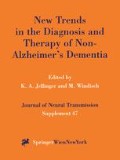Summary
Depressive disorder causes cognitive symptoms. In the case of severe cognitive symptoms or when psychometric procedures measure cognitive decline in the range of dementia, depressed patients may be diagnosed as Depressive Pseudo-Dementia (DPD). There is no data that depressive disorder can cause dementia without coexisting depressive symptoms. The latter symptoms are frequently overseen because cognitive symptoms are equated with organic brain disease. There are typical neuropsychological features of cognitive decline in depressive disorders, like psychomotor retardation and the slow-start phenomenon.
Most patients referred to as DPD, suffer from depression-induced cognitive symptoms outside the range of dementia, but complain of memory disturbance and inability to think or concentrate. The diagnosis of DPD draws attention to a problem in the diagnosis of psychiatric disorders in the elderly: Old people suffering from depression are at particular risk of beeing labelled as demented. The most important step to diagnose depression causing dementia is the search for signs and symtoms of affective disorder even after having found cognitive symptoms.
Access this chapter
Tax calculation will be finalised at checkout
Purchases are for personal use only
Preview
Unable to display preview. Download preview PDF.
References
Alexopoulos GS, Meyers BS, Young RC, Mattis S, Kakuma T (1993) The course of geriatric depression with “reversible dementia”: a controlled study. Am J Psychiatry 150: 1693–1699
American Psychiatric Association (1980) Diagnostic and statistical manual of mental disorders, 3rd edn. APA, Washington DC
American Psychiatric Association (1994) Diagnostic and statistical manual of mental disorders, 4th edn. APA, Washington DC
Arie T (1983) Pseudodementia. Br Med J 286: 1301–1302
Austin MP, Ross M, Murray C, O’Carroll RE, Ebmeier KP, Goodwin GM (1992) Cognitive function in major depression. J Affect Disord 25: 21–30
Bendefeldt F, Miller LL, Ludwig AM (1976) Cognitive performance in conversion hysteria. Arch Gen Psychiatry 33: 1250–1254
Blau E, Ober BA (1988) The effect of depression on verbal memory in older adults. J Clin Exp Neuropsychol 10: 81
Bleuler E (1916) Lehrbuch der Psychiatrie. Springer, Berlin
Brand AN, Jolles J, Gispen-de-Wied C (1992) Recall and recognition memory deficits in depression. J Affect Disord 25: 77–86
Bulbena A, Berrios GE (1986) Pseudodementia: facts and figures. Br J Psychiatry 148: 87–94
DeRenzi E, Vignolo LA (1962) The Token test: a sensitive test to detect receptive disturbances in aphasics. Brain 85: 665–678
Emery VO, Oxman TE (1992) Update on the dementia spectrum of depression. Am J Psychiatry 149: 305–317
Fischer P, Simanyi M, Danielczyk W (1990) Depression in dementia of Alzheimer type and multi-infarct dementia. Am J Psychiatry 147: 1484–1487
Folstein MF, Folstein SE, McHugh PR (1975) “Mini-Mental State”: a practical method for grading the cognitive state of patients for the clinician. J Psychiatr Res 12: 189–198
Fuld PA (1980) Guaranteed stimulus-processing in the evaluation of memory and learning. Cortex 16: 255–271
Förstl H (1991) Das Demenzsyndrom der Depression. Neuropsychiatrie 5: 23–25
Good MI (1981) Pseudodementia and physical findings masking significant psychopathology. Am J Psychiatry 136: 811–814
Huber W, Poeck K, Weninger D, Wilimes K (1982) Aachener Aphasie Test. Hogrefe, Göttingen
Kahn RL, Zarit SH, Hilbert NM, Niederehe G (1975) Memory complaint and impairment in the aged. The effect of depression and altered brain function. Arch Gen Psychiatry 32: 1569–1573
Kiloh LG (1961) Pseudo-dementia. Acta Psychiatr Scand 37: 336–351
Kraepelin E (1896) Lehrbuch der Psychiatrie. Barth, Leipzig
Kral VA (1982) Depressive Pseudodemenz and senile Demenz vom Alzheimertyp. Nervenarzt 53: 284–286
McAllister TW, Price TRP (1982) Severe depressive pseudodementia with and without dementia. Am J Psychiatry 139: 626–629
McAllister TW (1983) Overview: pseudodementia. Am J Psychiatry 140: 528–533
McEvoy JP, Wells CE (1979) Case studies in neuropsychiatry II. Conversion pseudodementia. J Clin Psychiatry 40: 447–449
McKhann G, Drachman D, Folstein M, Katzman R, Price D, Stadlan EM (1984) Clinical diagnosis of Alzheimer’s disease: report of the NINCDS-ADRDA Work Group under auspices of Department of Health and Human Services Task Force on Alzheimer’s disease. Neurology 34: 939–944
Nott PN, Fleminger JJ (1975) Presenile dementia: the difficulties of early diagnosis. Acta Psychiatr Scand 51: 210–217
Pearlson GD, Rabins PV, Kim WS, Speedie LJ, Moberg PJ, Burns A, Bascom MJ (1989) Structural brain CT changes and cognitive deficits in elderly depressives with and without reversible dementia (“pseudodementia”). Psychol Med 19: 573–584
Pettinati HM, Brown M, Mathisen KS (1985) Memory complaints in depressed geriatric inpatients. Ann NY Acad Sci 444: 528–530
Pinel P (1798) Nosographie philosophique. Salpêtrière, Paris
Rabins PV, Merchant A, Nestadt G (1984) Criteria for diagnosing reversible dementia caused by depression: validation by 2-year follow-up. Br J Psychiatry 144: 488–492
Rabins PV (1988) Does reversible dementia exist and is it reversible? Arch Intern Med 148: 1905
Reding M, Haycox J, Blass J (1985) Depression in patients referred to a dementia clinic. A three-year prospective study. Arch Neurol 4: 894–896
Reifler BV (1982) Arguments for abandoning the term pseudodementia. J Am Geriatr Soc 30: 665–668
Reifler BV, Larson E, Hanley R (1982) Coexistence of cognitive impairment and depression in geriatric outpatients. Am J Psychiatry 139: 623–626
Richards PM, Ruff RM (1989) Motivational effects on neuropsychological functioning: comparison of depressed versus nondepressed individuals. J Consult Clin Psychol 57: 396–402
Sachdev PS, Smith JS, Angus-Lepan H, Rodriguez P (1990) Pseudodementia twelve years on. Neurol Neurosurg Psychiatry 53: 254–259
Shraberg D (1978) The myth of pseudodementia: depression and the aging brain. Am J Psychiatry 135: 601–603
Wells CE (1979) Pseudodementia. Am J Psychiatry 136: 895–900
Zimmer R, Lauter H (1984) Zum Problem der depressiven Pseudodemenz. Z Gerontol 17: 109–112
Author information
Authors and Affiliations
Editor information
Editors and Affiliations
Rights and permissions
Copyright information
© 1996 Springer-Verlag
About this paper
Cite this paper
Fischer, P. (1996). The spectrum of depressive pseudo-dementia. In: Jellinger, K.A., Windisch, M. (eds) New Trends in the Diagnosis and Therapy of Non-Alzheimer’s Dementia. Journal of Neural Transmission Supplement, vol 47. Springer, Vienna. https://doi.org/10.1007/978-3-7091-6892-9_13
Download citation
DOI: https://doi.org/10.1007/978-3-7091-6892-9_13
Publisher Name: Springer, Vienna
Print ISBN: 978-3-211-82823-6
Online ISBN: 978-3-7091-6892-9
eBook Packages: Springer Book Archive

